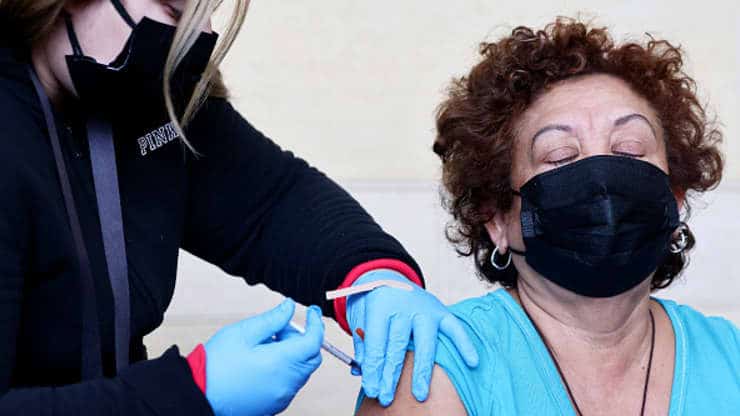
Mario Tama | Getty Images
A booster dose of the Covid-19 vaccine significantly reduces a person’s odds of hospitalization from the omicron variant, new research released Friday by the Centers for Disease Control and Prevention finds.
The three new studies from the agency are among the first to look at the vaccines’ impact against omicron in the United States, which now accounts for more than 99 percent of new cases in the country.
The research underscores the importance of booster shots to protect against severe illness from the rapidly spreading variant, which has overwhelmed hospitals.
“You don’t want to be that one person that has a bad outcome, that requires hospitalization, when there’s no hospital bed for you,” said Syra Madad, an infectious disease epidemiologist at the Harvard Belfer Center for Science and International Affairs.
The new studies find that a booster shot can provide significant protection against needing emergency medical care or hospitalization because of Covid-19.
In one analysis of 259 hospitals and 383 emergency departments from late August through early January, a third dose of either the Pfizer-BioNTech or Moderna vaccine was found to reduce the odds of a hospital or emergency room visit by 94 percent during the delta wave, and by 82 percent once omicron started spreading.
The data included adults who’d received either the Pfizer or Moderna vaccines. The study authors were able to tease out the effects of the boosters during both the delta and omicron waves of Covid.
Read more: Fauci says multiple preliminary studies find omicron is less severe than delta
When delta was surging, the two doses of the vaccine were 86 percent effective against visits to emergency departments and urgent care centers for Covid illnesses. That effectiveness fell to 76 percent after 6 months, but a booster raised the effectiveness to 94 percent.
Less than half of the U.S. population eligible for a booster dose has received one, according to CDC data.
The new research suggests that a booster dose is even more important now that omicron accounts for virtually all Covid cases in the U.S.: Against omicron, the vaccines’ effectiveness for keeping people out of ERs and urgent care centers fell dramatically, to 38 percent 6 months after the second dose. A booster shot raised that level of effectiveness to 82 percent.
When researchers looked specifically at patients who needed to be admitted to the hospital during the omicron surge, two shots were 81 percent effective. That effectiveness fell to 57 percent in people who were 6 months out from their second dose, but then rose to 90 percent after a third dose.
Two additional studies, also published Friday by the CDC, suggest that boosters offered “significant protection” against both infection and symptomatic Covid, though that protection was higher during the delta surge compared with omicron.
One of the studies, published in the CDC’s Morbidity and Mortality Weekly Report, found that people who received three doses of an mRNA vaccine were more protected against infection, compared to people with only two doses. This was particularly true for people over age 50, the study found.
Another study, published in the Journal of the American Medical Association, found that three doses of an mRNA vaccine were more protective against symptomatic Covid, compared with people who were either unvaccinated or who had only received two shots.

